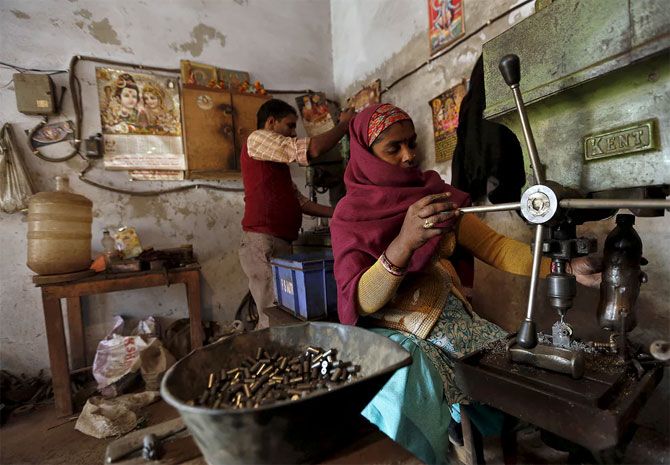Under the New Code on Wages Bill 2019, employers will be required to give the minimum wages, notified by either the state or the Centre, to the unorganised sector, too.

The Centre has proposed reducing the number of minimum wage levels prevalent in the country substantially, in the Code on Wages Bill 2019 introduced by labour and employment minister Santosh Kumar Gangwar on Tuesday.
According to a proposal in the Bill, state governments and the Centre -- in their respective jurisdictions -- will fix the minimum wage level based on two factors -- skill set and geography (rural or urban, hills or plains).
Employers will be required to give the minimum wages, notified by either the state or the Centre, to the unorganised sector, too.
At present, only a particular list of occupations, notified by the central government, are covered by the minimum wage law. This move will ensure “protection of minimum wages from 40 per cent to 100 per cent of the workforce.”
At present, there are over 2,500 minimum wage variants across the country as they vary based on occupation, area, work and skills. A senior government official said that the number of minimum wages may reduce to around 300 after the Code on Wages Bill is passed by both Houses of Parliament.
However, one factor which the states may keep in mind while fixing the minimum wage is “arduousness” of works, in terms of temperature, humidity and hazardous occupations, among others, in accordance with a provision in the Bill.
The state governments will not be allowed to fix minimum wages below the statutory floor fixed by the Centre.
“Introduction of the statutory floor wage to be computed based on minimum living conditions will extend qualitative living conditions across the country to about 500 million workers,” an official statement issued by the labour and employment ministry said.
Significantly, the government has proposed a single definition of wage which will be the same for all the four labour codes it plans to introduce in Parliament, going ahead.
The ‘wage’, on which statutory deductions towards provident fund, insurance, gratuity and others are made by employers, will include basic pay, dearness allowance and retaining allowance as its components.
However, various other allowances -- in the form of house rent, leave travel and overtime, among others -- are proposed to be capped at 50 per cent of the ‘wage.’
“There are 12 definitions of wages in different labour laws leading to litigation besides difficulty in its implementation,” the statement said.
The move will ensure that companies do not fix the basic components of a salary at lower levels -- a practice adopted by many firms so that statutory deductions towards various social security schemes, including provident fund, are lower.
The labour ministry termed the Bill as “a historical step for ensuring statutory protection for minimum wage and timely payment of wage to 500 million workers in the country.”
The Code on Wages Bill was earlier introduced in the Lok Sabha in August 2017 and was referred to the Standing Committee on Labour which submitted its report in December 2018.
The government has incorporated 17 out of the 24 suggestions given by the committee in the fresh draft of the Bill introduced in Parliament on Tuesday, according to a government official.












 © 2025
© 2025